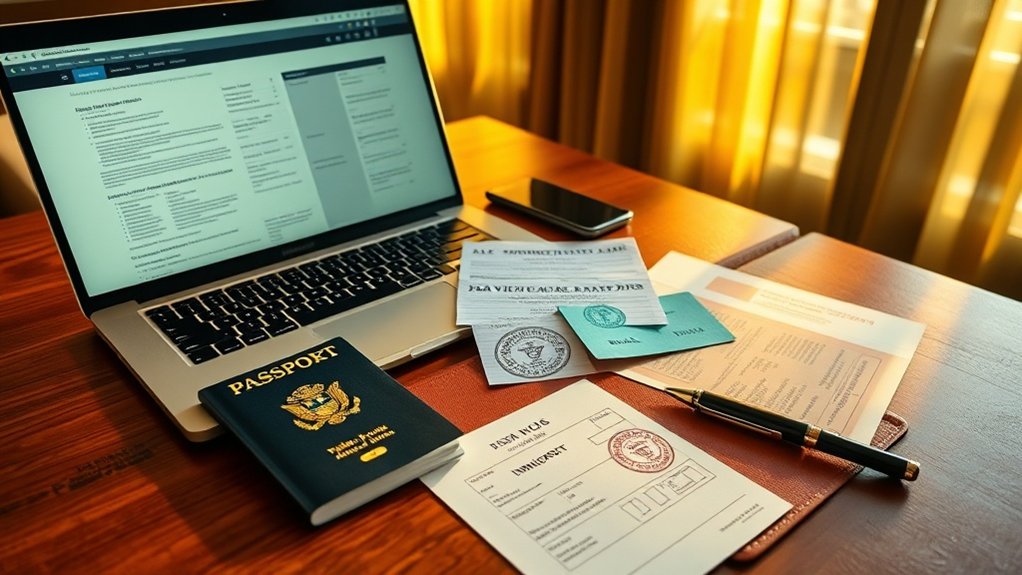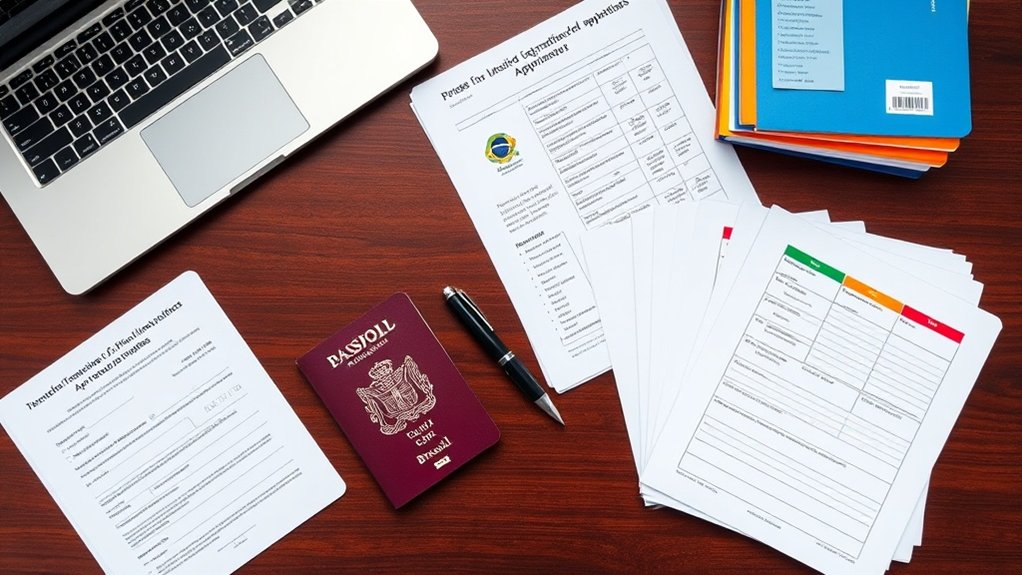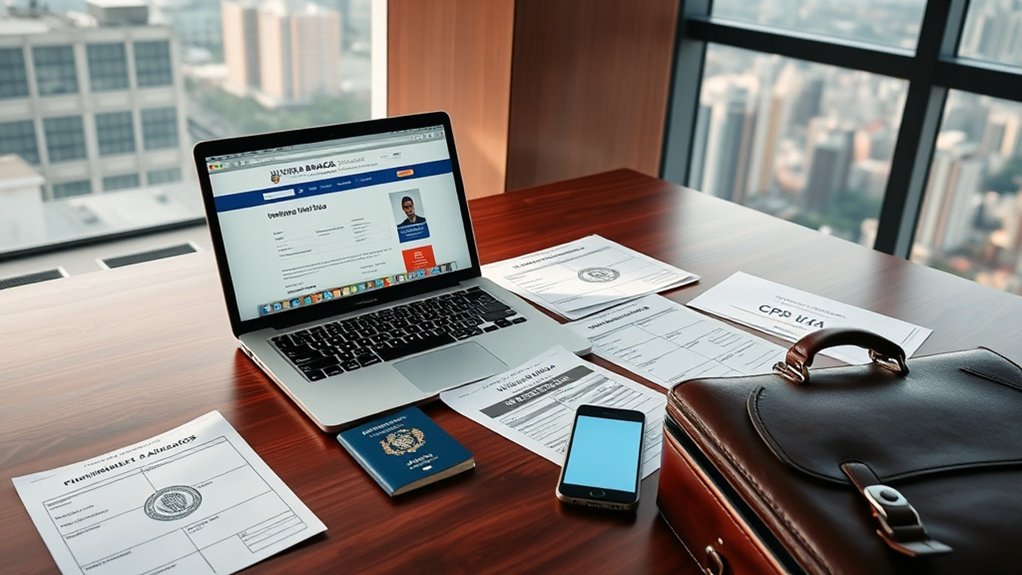You’re eyeing Brazil as your next remote work destination, but there’s a critical step you can’t overlook: obtaining your CPF. This tax identification number isn’t just bureaucratic paperwork—it’s your gateway to banking, healthcare, and countless essential services. What most digital nomads don’t realize is how timing your CPF application with your visa process can make or break your Brazilian adventure.
Understanding CPF Requirements for Foreign Remote Workers

As a foreign remote worker considering Singapore as your base, you’ll need to navigate the Central Provident Fund (CPF) system that forms the backbone of the country’s social security framework. Your CPF obligations depend entirely on your employment status and residency classification.
If you’re working remotely for foreign companies while residing in Singapore, you’re typically not required to contribute to CPF unless you become a Singapore citizen or permanent resident. However, if you secure employment with a Singapore-based company, CPF contributions become mandatory regardless of your citizenship status.
The system requires both employee and employer contributions, with rates varying based on your age and residency status. Foreign employees contribute the same percentages as locals, but allocation across different CPF accounts may differ.
Understanding these requirements early prevents compliance issues and helps you plan your financial structure effectively. Consult immigration lawyers to ensure your remote work arrangement aligns with Singapore’s regulatory framework.
For those seeking permanent residency in Singapore, employment-based visa categories offer structured pathways that can align with your professional qualifications and long-term career objectives.
Strategic Coordination Between Tax Registration and Visa Processes
Beyond CPF compliance, you’ll need to orchestrate your tax registration with Singapore’s immigration requirements to avoid administrative bottlenecks that could jeopardize your nomad setup.
Timing becomes critical when you’re juggling multiple government agencies. Your CPF registration must align seamlessly with your visa application timeline, preventing delays that could force you to leave Singapore mid-process. Vieira Braga Advogados coordinates these moving parts to ensure smooth transitions.
Key coordination strategies include:
- Submit tax documentation before visa renewal deadlines – Missing cutoffs means starting over
- Secure employment pass approval prior to CPF enrollment – Wrong sequence creates rejection loops
- Maintain consistent personal information across all applications – Discrepancies trigger manual reviews
- Schedule biometric appointments around tax office availability – Conflicting schedules cause weeks of delays
- Prepare backup documentation for both processes simultaneously – Missing papers derail everything instantly
This synchronized approach prevents the administrative chaos that destroys nomad plans and protects your investment in Singapore residency. Proper documentation requirements ensure you meet both tax and immigration obligations without bureaucratic complications.
Essential Documentation and Timeline Management

When you’re managing CPF setup alongside nomad logistics, your documentation strategy determines whether you’ll complete the process in weeks or get trapped in months of bureaucratic delays.
You’ll need your passport, proof of address (even temporary), and income documentation ready before initiating either process. Digital nomads often struggle because they lack permanent addresses, but Airbnb confirmations or hotel bookings work as temporary proof.
Start your CPF application immediately after securing your visa appointment. The Federal Revenue Service processes CPF requests within 5-7 business days when documentation’s complete, while visa processing takes 15-30 days depending on your nationality.
Create a master timeline coordinating both processes. Submit your CPF application on day one, schedule your visa appointment for day 10-15, and plan to receive both documents within 30 days maximum.
Keep digital copies in cloud storage and physical copies in waterproof folders. Brazil’s humid climate and occasional document requests make backup accessibility crucial for avoiding restart delays.
Consider consulting an immigration lawyer during this process, as legal guidance helps prevent documentation errors that could result in delays, rejections, or administrative complications that derail your timeline.
Accessing Brazilian Services With Your New CPF
Once your CPF arrives, you’ll unlock access to Brazil’s entire digital ecosystem, from opening bank accounts to registering for essential apps that make nomad life manageable.
Your CPF transforms everyday tasks from frustrating barriers into simple processes. Banking becomes straightforward as major institutions like Itaú, Bradesco, and Nubank welcome foreign residents. You’ll register for healthcare services, sign rental agreements, and access government portals without bureaucratic roadblocks.
Essential services now within reach include:
- Banking and finance – Open accounts, apply for credit cards, and use digital payment platforms like Pix
- Healthcare enrollment – Register with SUS (public healthcare) or private insurance providers
- Utility connections – Set up electricity, water, internet, and phone services in your name
- Transportation access – Register for ride-sharing apps, car rentals, and public transit cards
- E-commerce platforms – Shop on Mercado Livre, Magazine Luiza, and other Brazilian marketplaces
This documentation legitimizes your presence and integrates you into Brazil’s modern infrastructure, making remote work sustainable long-term. Since Brazil’s New Migration Law introduced significant changes to immigration processes, having your CPF properly established becomes even more critical for maintaining legal compliance while working remotely.
Maintaining Compliance While Working Remotely From Brazil

While your CPF opens doors to Brazilian services, it also creates tax and legal obligations that require careful navigation. You’ll need to understand Brazil’s tax residency rules, which can trigger local tax obligations if you spend more than 183 days in the country during a twelve-month period.
Your income sourcing determines tax liability. If you’re earning from foreign clients while physically in Brazil, this income may become taxable locally. You must track your days in-country meticulously and maintain proper documentation of your work arrangements and income sources.
Consider filing annual tax declarations even if you’re not required to, as this demonstrates good faith compliance. You’ll also need to stay current with any visa requirements and ensure your work activities align with your immigration status.
Simple mistakes in documentation or procedure compliance can result in application denials or unnecessary delays that affect your ability to maintain legal status while working remotely.
Consult with Brazilian tax professionals regularly to avoid penalties and maintain proper compliance while maximizing your ability to work remotely from Brazil.
Frequently Asked Questions
Can Digital Nomads Open Brazilian Bank Accounts Without Permanent Residency Status?
You can open Brazilian bank accounts as a digital nomad without permanent residency, but you’ll need specific documents. Most banks require your CPF (tax ID), passport, proof of income, and address verification in Brazil. Some banks are more foreigner-friendly than others – digital banks like Nubank, C6 Bank, and Inter typically have streamlined processes for non-residents. You’ll likely need to visit a branch initially to complete the account opening.
What Happens to My CPF if I Leave Brazil Permanently?
Your CPF doesn’t automatically cancel when you leave Brazil permanently. It remains active in the Federal Revenue system indefinitely. However, you’ll need to file a final tax return declaring your departure and settle any outstanding tax obligations. If you don’t use your CPF for extended periods, it may become suspended, but you can reactivate it later if you return to Brazil.
Are There CPF Renewal Requirements for Long-Term Digital Nomads?
You don’t need to renew your CPF as a long-term digital nomad since it doesn’t expire. However, you’ll need to keep your registration information updated, especially your address and contact details. If you’re living abroad for extended periods, you should inform the Federal Revenue Service about your tax residency status changes. You’ll also need to file annual tax declarations if you maintain Brazilian tax residency or have income sources in Brazil.
Can I Use My CPF to Invest in Brazilian Real Estate?
Yes, you can use your CPF to invest in Brazilian real estate. Your CPF serves as your tax identification number and enables you to purchase property, open bank accounts, and complete real estate transactions in Brazil. You’ll need it for all legal documentation, financing applications, and property registration processes. However, you should verify any foreign ownership restrictions that might apply to specific property types or locations before investing.
Does Having a CPF Affect My Tax Obligations in My Home Country?
Having a CPF doesn’t automatically create tax obligations in your home country, but it can trigger reporting requirements. You’ll need to declare your Brazilian assets and income to your home tax authority if they exceed certain thresholds. Most countries tax based on residency or citizenship, not where you hold identification numbers. However, you should consult your home country’s tax professional to understand specific disclosure rules.
Conclusion
You’ll find that coordinating your CPF setup with immigration steps eliminates the bureaucratic headaches that trip up most digital nomads in Brazil. By working with specialists who understand both tax and visa requirements, you’re positioning yourself for seamless access to banking, healthcare, and other essential services. Don’t let misaligned paperwork derail your remote work plans—get your documentation strategy right from the start and maintain compliance throughout your Brazilian adventure.



